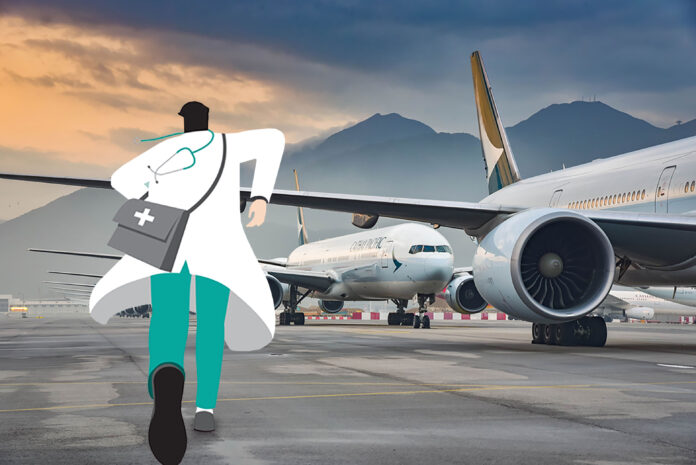Are you a doctor in Pakistan? Have you just graduated and are about to begin your house job? Or are you possibly in your last couple of years of med school? For that matter are you even a mid-career young-doctor working as a PG Trainee or an MO? If any of these apply to you, we have a piece of advice: run. Give whatever test you need to, find whatever opportunity you can in a different country, take your skills, and leave.
Young doctors in Pakistan are being robbed blind. As one of the most highly skilled professionals in the country, they are overworked and underpaid. And unless you have either the right connections, a wealthy background, or access to the correct institutions setting up a private practice (which is where the money is at) is next to impossible.
A bad financial decision
There are two kinds of medical students. Those that go to government medical colleges and those that go to private ones. While the private ones are dreadfully expensive, costing on average Rs 5-6 million for a full ride through five years, the pay-off is far from immediate and difficult to achieve. And even for those studying on subsidised rates at government colleges the path to financial stability is paved with uncertainty.
After MBBS, a student starts working as an HO (House Officer)- what is commonly known as House Job. A fresh graduate isn’t licensed to be a medical practitioner. The Pakistan Medical Council (PMC) issues a temporary licence. An HO becomes an MO (Medical Officer) if they begin working immediately after the completion of their House Job. In case they pursue further training (i.e. specialisation), they’re known as PGs — post-graduate trainees. The content in this publication is expensive to produce. But unlike other journalistic outfits, business publications have to cover the very organizations that directly give them advertisements. Hence, this large source of revenue, which is the lifeblood of other media houses, is severely compromised on account of Profit’s no-compromise policy when it comes to our reporting. No wonder, Profit has lost multiple ad deals, worth tens of millions of rupees, due to stories that held big businesses to account. Hence, for our work to continue unfettered, it must be supported by discerning readers who know the value of quality business journalism, not just for the economy but for the society as a whole.To read the full article, subscribe and support independent business journalism in Pakistan










Yes, I’m young dr, doing my homejob !
This content is helpful too , for me specially.
I understand what you’re referring to, it’s very nice, easy to understand, very knowledgeable.
사설 카지노
j9korea.com
Well informative content, being a Dr I appreciate you guys ! keep posting such stuff , as I keenly search for the content like posted by you.
This is true across most profesisons including accountancy , IT sector etc !
The excessive focus on Doctors is reflective of a typical mind set in Pakistan about Medical being too esteemed a profession.
My husband and I are another successful client of Cyber Genie Intercontinental among many. I read countless positive reviews about how they have been using their cyber expertise to help people achieve their happiness back by recovering their scammed or lost Bitcoin and assets from fraudulent and posers of Cryptocurrencies trading companies. After reading many of the wonderful services they render, I had to contact them because my husband was seriously defrauded by some Chinese bitcoin miners, it all ended in goodwill as we were able to recover what we thought we had lost to scammers. Contact them on [ Cybergenie AT cyberservices DOT com ] WHATSAPP [ +1 ] 2.5.2-5,1,2-0.3,9.1 ] and help yourself from depression.
NOT 5-6 MILLION BUT UPTO 10 MILLION IS FEE OF PRIVATE COLLEGES
Good to see, main stream papers are highlighting the docotors woes, have read some comments by some people below this articles facebook post regarding why docotors should be paid more when economy is weak.
The thing is if you divide the salary by days a PG doctor earns around Rs.3000/day roughly, with working hours that touch more than 60/week with night duties and hard area duties like E.R.
If we see the whole picture we can realize the pay is not proportionate to the work. Take with it the rising cost of living, and multiplying costs of homes/means of traveling.
What are the solutions? God knows but from the doctors perspective 2 out of 3 are planning to proceed abroad for training and better compensation and work life balance
The prevalent mentality in Pakistan is that medicine is a very respected field of work, which is shown in the disproportionate importance placed on physicians.
As a doctor, I really appreciate the helpful stuff you guys put out there. Please continue to publish content of this nature, as I am actively looking for content similar to that which you have posted.
Nerve decompression is a surgical procedure that aims to relieve pressure on nerves that have become compressed or entrapped due to injury or surrounding tissue damage. The procedure involves cutting or releasing the surrounding tissues to allow the nerve to move freely, reducing pain and improving function. Nerve decompression can be used to treat a variety of conditions, including carpal tunnel syndrome, cubital tunnel syndrome, and tarsal tunnel syndrome. The procedure is typically performed on an outpatient basis and involves a relatively short recovery time.